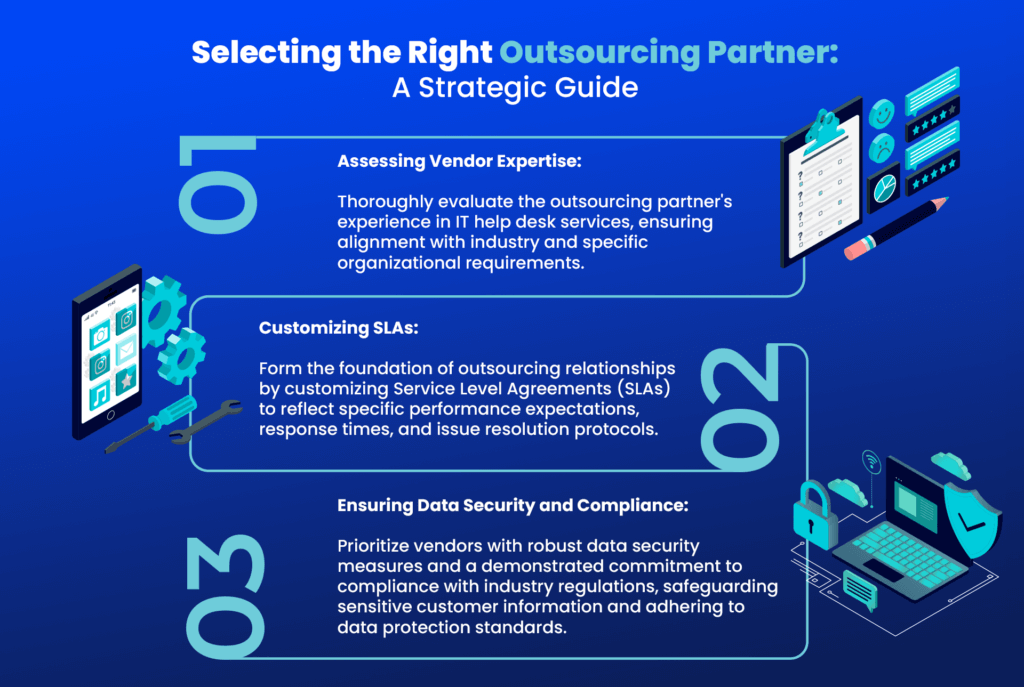Understanding the potential benefits and challenges is crucial for making informed decisions that align with the organization’s overall goals and objectives.
This article explores key considerations for CEOs venturing into IT help desk outsourcing, offering insights into the strategic landscape of this critical business function.
Key Benefits of Outsourcing IT Help Desk
Enhancing Operational Efficiency and Scalability
Outsourcing IT help desk services provides a scalable solution, allowing organizations to adapt quickly to changing demands. This flexibility enhances operational efficiency by ensuring that support services can expand or contract in response to business needs.
Cost Optimization Strategies for IT Support
Cost optimization is a primary motivator for outsourcing IT help desk functions. By leveraging external expertise, organizations can reduce operational costs associated with hiring, training, and maintaining an in-house support team, directing resources more efficiently.
Access to Specialized Expertise and Cutting-Edge Technologies
Outsourcing partners often bring specialized skills and expertise to the table. This access to a broader skill set and cutting-edge technologies ensures that the organization benefits from the latest advancements without the burden of continuous internal training and development.
How to Select the Right Outsourcing Partner?
Assessing Vendor Expertise and Track Record:
Choosing the right outsourcing partner requires a thorough assessment of their expertise and track record. CEOs should scrutinize the vendor’s experience in providing IT help desk services, ensuring alignment with the organization’s industry and unique requirements.
Customizing Service Level Agreements (SLAs):
Service Level Agreements (SLAs) form the foundation of outsourcing relationships. Customizing SLAs to reflect specific performance expectations, response times, and issue resolution protocols is critical for achieving desired service outcomes.
Ensuring Data Security and Compliance
Security is paramount in IT outsourcing. CEOs must prioritize vendors with robust data security measures and a demonstrated commitment to compliance with industry regulations. This includes safeguarding sensitive customer information and adhering to data protection standards.
Strategies for Maximizing ROI in IT Help Desk Outsourcing
a. Performance Metrics and Key Performance Indicators (KPIs):
Establishing clear performance metrics and Key Performance Indicators (KPIs) is essential for monitoring the success of IT help desk outsourcing. Metrics such as response times, issue resolution rates, and customer satisfaction scores provide tangible insights into the outsourcing partnership’s effectiveness.
b. Leveraging Automation and Technology Solutions:
Automation is a game-changer in IT help desk outsourcing. CEOs should explore how outsourcing partners leverage automation and technology solutions to streamline processes, reduce response times, and enhance overall efficiency.
c. Periodic Review and Optimization of Outsourcing Agreements:
Successful outsourcing partnerships require ongoing evaluation. CEOs should implement regular reviews of outsourcing agreements to ensure continued alignment with organizational goals, making adjustments as needed to optimize performance and value.

Addressing Concerns: Common Misconceptions About IT Help Desk Outsourcing
a. Overcoming Resistance and Fostering a Positive Company Culture:
Resistance to change is a common concern when outsourcing IT help desk services. CEOs must proactively address employee concerns, emphasizing the positive impact on overall company culture and the opportunity for internal teams to focus on strategic initiatives.
b. Dispelling Myths About Quality and Control:
Misconceptions about a loss of quality and control can hinder outsourcing decisions. CEOs should actively dispel these myths, emphasizing that reputable outsourcing partners prioritize quality, adhere to agreed-upon standards, and work collaboratively with internal teams.
c. Mitigating Risks Through Robust Governance:
Effective governance is key to mitigating risks in IT help desk outsourcing. CEOs should implement robust governance frameworks that include regular communication, performance monitoring, and mechanisms for issue resolution, ensuring a transparent and accountable outsourcing relationship.
Cultural Fit and Integration: Aligning Outsourced Services with Company Values
a. Ensuring Cultural Alignment with the Outsourcing Partner: Cultural alignment is critical for a harmonious outsourcing partnership. CEOs should select vendors whose values align with the organization’s culture, fostering collaboration and a shared commitment to excellence.
b. Strategies for Seamless Integration of Outsourced Teams: Seamless integration of outsourced teams requires strategic planning. CEOs should implement integration strategies that encourage open communication, cross-cultural understanding, and a unified approach to achieving common goals.
c. Nurturing a Collaborative and Unified Work Environment: A collaborative work environment is essential for the success of outsourced teams. CEOs should nurture an inclusive culture that values contributions from both internal and external team members, fostering a unified approach to IT help desk operations.
User-Centric Approach: Enhancing End-User Experience through Outsourcing
In ensuring a superior end-user experience through IT help desk outsourcing, it is crucial to emphasize user-centric practices. A focus on swift issue resolution, the implementation of user-friendly technologies, and continuous training initiatives contribute to heightened user satisfaction.
For CEOs seeking a reliable partner in IT help desk outsourcing, Alketek Solutions offers tailored solutions designed to enhance operational efficiency and user satisfaction.
Explore our comprehensive range of services to elevate your IT support capabilities.
The decision to outsource IT help desk services requires a strategic mindset, considering not only cost savings but also the broader impact on organizational efficiency, user experience, and cultural alignment.
By following the outlined considerations and implementing a user-centric approach, CEOs can navigate the complexities of IT help desk outsourcing and position their organizations for sustained success in a rapidly evolving business landscape.


